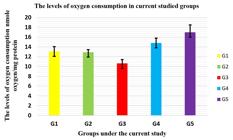Abstract
Repeatedly frying process of dietary edible oil has a potential role in the generation of free radicals. Therefore, questions have always been raised as to whether, there is an efficient and economical method to reduce the harmful effects of repeated use of frying edible oil. Since hibiscus has been stated to have a wide variety of therapeutic effects, it was important to investigate its properties against harmful effects of free radicals. The current study aspires to find out whether irradiated powder of hibiscus has a protective role against adverse effects of repeated use of frying edible oil. Thirty-five adult male albino rats were equally assigned into five groups. First group”G1” was fed with normal diet as control group, meanwhile, group”G2” the diet mixed with fresh oil, “G3” diet mixed with repeatedly frying oil only, “G4” diet mixed with frying oil treated with hibiscus and “G5” diet mixed with frying oil treated with irradiated hibiscus. Feeding duration was six weeks. Fatty acid analyses of oil as well as peroxide values were determined. Blood and liver samples were collected for biochemical analyses as well as histological study. Repeatedly heated cooked oil has significant increases in peroxide value, acid value, free fatty acid and both conjugated diene and triene compared with repeatedly frying oil treated with hibiscus. Also there are significant increases in cholesterol and triglyceride and impaired in liver functions in “G3”compared with others. In addition, relative to the hibiscus groups, there is a substantial reduction in oxygen consumption in “G3”. Both hibiscus as well as irradiated hibiscus attract attention in order to play a vital and economical role against harmful effects of frequent use of frying edible oil on some biological functions but, irradiated hibiscus was more effective.
Keywords:
frying oil; irradiated hibiscus; liver functions; oxygen consumption assays; lipid profile; peroxide value; free fatty acid; acid value

 Thumbnail
Thumbnail
 Thumbnail
Thumbnail

